Share this Post
The COVID-19 emergency is driving customers online. With many shops, offices and food outlets closed — or with restricted opening hours and new customer capacity limits in place to maintain social distancing — businesses have been forced to adapt to the new digital way of life.
Digital transformation initiatives have been accelerated to allow employees to work from home — and since they are at home, these consumers are shopping online more than ever before, particularly for food, fast-moving consumer goods (FMCG) and health and pharmaceutical products.
As such, COVID-19 has driven unprecedented growth in ecommerce around the globe. Figures from Bazaarvoice up to the end of Q2 2020 show that both page views (+75%) and order count (+57%) are up significantly year-over-year.
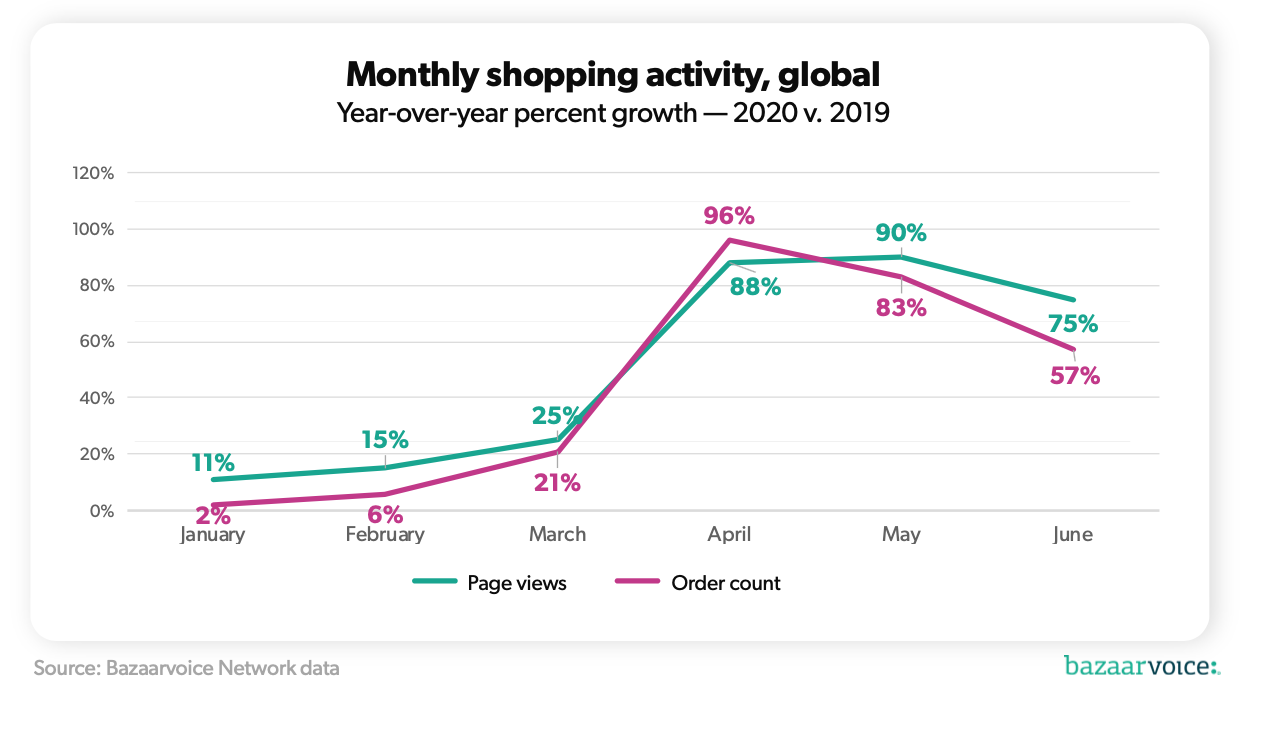
Shoppers are still spending time online —Source: bazaarvoice.com
While this growth is down from April and May at the peak of lockdowns, it’s still more significant growth than the growth pre-pandemic.
Growth is also expected to continue across all digital services, according to a global consumer survey from McKinsey. On average, 70% of respondents plan to use digital services to the same degree or more after the COVID-19 crisis.

Respondents plan to continue using digital services —Source: mckinsey.com
This creates great competition between businesses across all categories to reach customers where they are online. In other words, ecommerce players aren’t just competing with other ecommerce businesses for online consumer attention — but all other businesses.
Amidst it all, experts are predicting this year will witness the busiest digital holiday shopping season in history, with ecommerce sales growing as much as 35%. However, based on an increase in orders combined with social distancing measures in distribution centres, they also warn that the ability for packages to arrive on time will be significantly constrained as organisations struggle with fulfilment.
This will lead to millions (if not billions) of Where Is My Order (WISMO) customer service inquiries contact centre agents will have to field, not to mention the higher rate of returns they’ll have to deal with due to customers purchasing alternative gifts because of anticipated late delivery.
To navigate it all, remain relevant and keep customers informed and happy, organisations need to adapt their digital marketing strategies to win the trust of customers.
At its core, marketing is about communication — and in times of crisis and disruption, communication is more important than ever.
Here are some key considerations for reviewing your digital marketing strategy and communications to build trust with your customers.
Do Good and Talk About It
Trust and authenticity are some of the most important aspects of a brand’s relationship with its customers.
According to Edelman’s Trust Barometer Special Report: Brand Trust and the Coronavirus Pandemic, 81% of consumers say “I must be able to trust the brand to do what is right.”
More specifically, consumers want to know what brands are doing to help tackle the crisis. Why? Because 62% of consumers believe that their country will not survive the corona crisis without brands playing a decisive role in overcoming the current challenges — and 89% are calling on brands to cooperate with the government and shift money and resources to producing products that help people meet pandemic-related challenges.
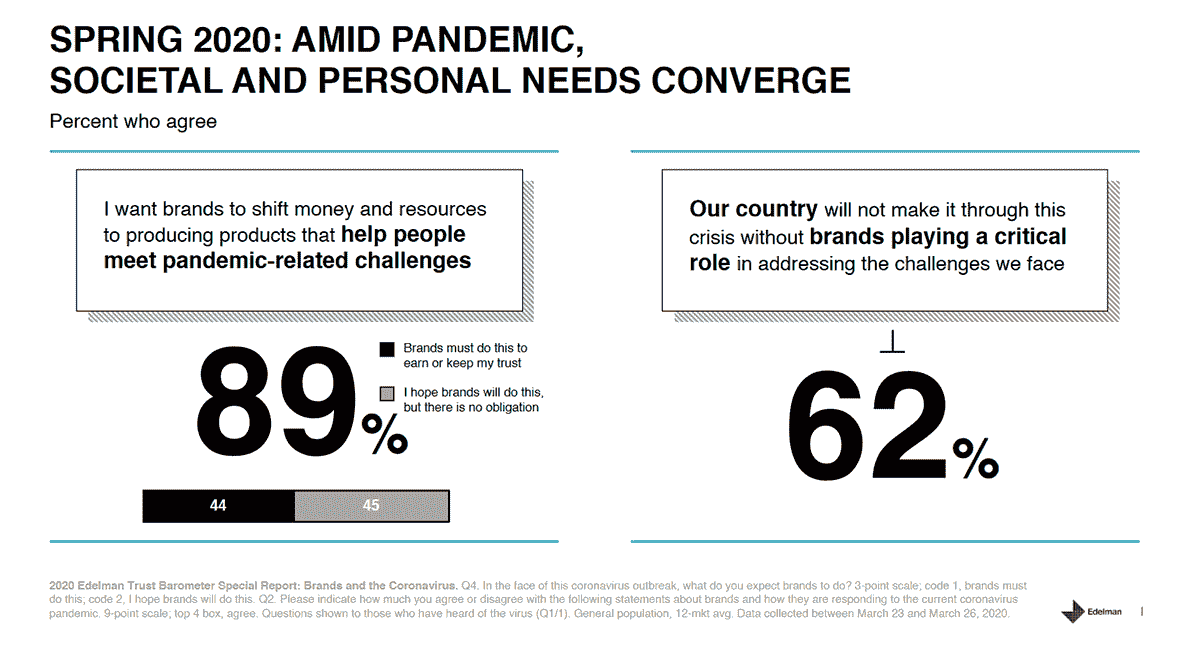
Societal and Personal Needs Converge —Source: edelman.com
Consumers are even willing to switch brands — and convince others to do the same — if they feel a brand is not acting responsibly or compassionately enough in response to the pandemic.
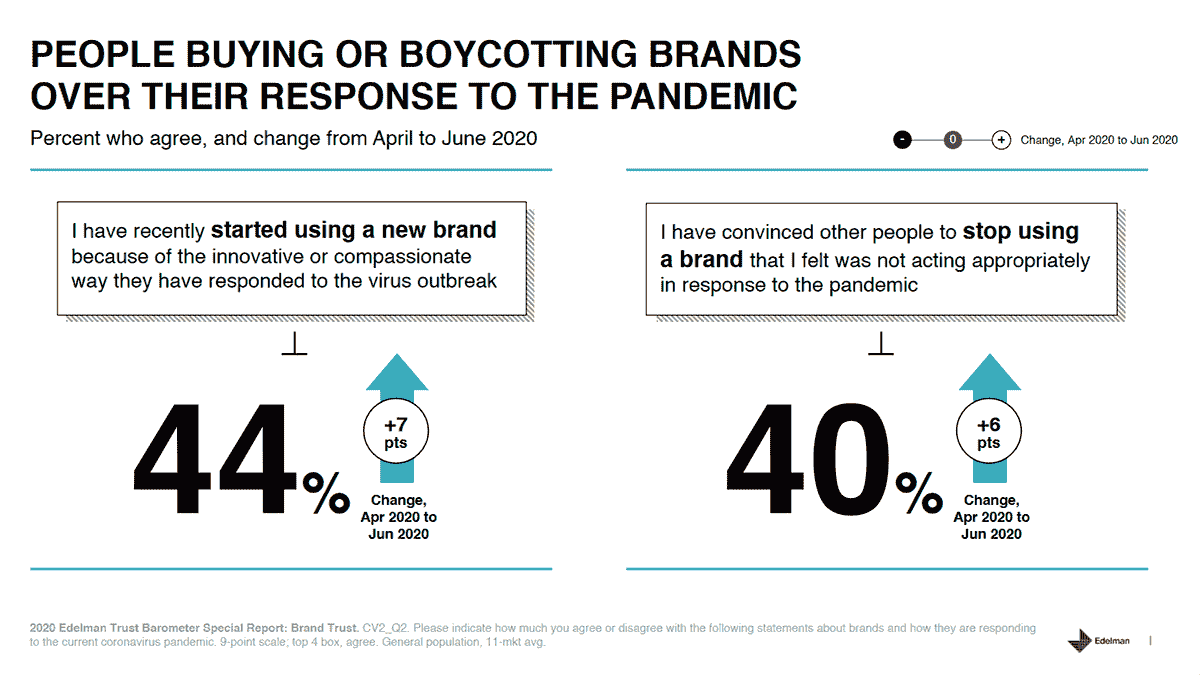
People buying or boycotting brands —Source: edelman.com
90% also want to see that brands are protecting the health, well-being and financial security of both their employees and their suppliers, even if it means suffering financial losses.
As Britta Heer, Managing Director Brand Marketing and Brand Expert at Edelman Germany, puts it: “Brands must put people and their needs first, purely economic interests are currently secondary.”
Heer encourages brands not only to do good — but talk about the good they’re doing in their digital marketing messages. “It’s important that the brands also communicate their measures accordingly,” Heer says. Indeed, 89% of those surveyed stated that brands should inform the public comprehensively about their commitment against COVID and their measures for employee and customer protection — and 82% that this commitment should also be reflected in advertising. “It is essential for brands to communicate properly now. The message is: If you don’t listen to consumers now and don’t respond to their needs, you are putting their trust at risk for the long term. Brands must show that they are making a real difference in this crisis,” explains Heer.
The lesson is, give back to your customers and the community (HP’s donation of 3D printers to hospitals to produce facemasks is an example). Participate in charitable works or volunteer activities. Pledge a share of your business to the people most affected (like entrepreneurs and companies such as EthicsGrade are doing in the UK through GenieShares). Create special offers to help customers through these difficult times — be it discounts, coupons, or extending subscriptions. At metasfresh, we offered 6 months’ free hosting to support companies in keeping their digital processes running during the pandemic.
In short, help all you can in the response to the crisis (we really are all in this together) — and communicate your efforts to your customers through your website, social media marketing, email marketing, videos, blogs, native ads and other digital channels.
Keep Customers in the Loop About Services, Deliveries and Returns Policies
Smart ecommerce businesses recognise that a customer-centric returns policy is a powerful marketing tool. According to UPS, 68% of shoppers check a website’s return and exchange policy before making a purchase, and 96% say straightforward returns would prompt them to buy from the same source again.
Now, in this time of crisis where customers either can’t or are reluctant to venture into stores to touch and try before they buy, hassle-free returns are an even more important strategic differentiator — particularly as we approach the busy holiday season.

Communicate with emotion, compassion and facts —Source: edelman.com
Deliveries, of course, are also important — and for both, customers need to be informed how deliveries and returns work and that they will be safe when goods arrive at or are picked up from their door. Update your website and ordering channels to highlight health precautions to help customers feel comfortable ordering online.
This is important. According to the Edelman survey, people want brands to do more to inform customers, yet there is a perceived performance gap across industries.

Keeping people informed —Source: edelman.com
Educate, Empathise and Connect
There are other ways to keep customers informed. Indeed, brands are a key source of information during the crisis. 84% of Edelman respondents globally said they want brands to be a reliable news source that keeps people informed.
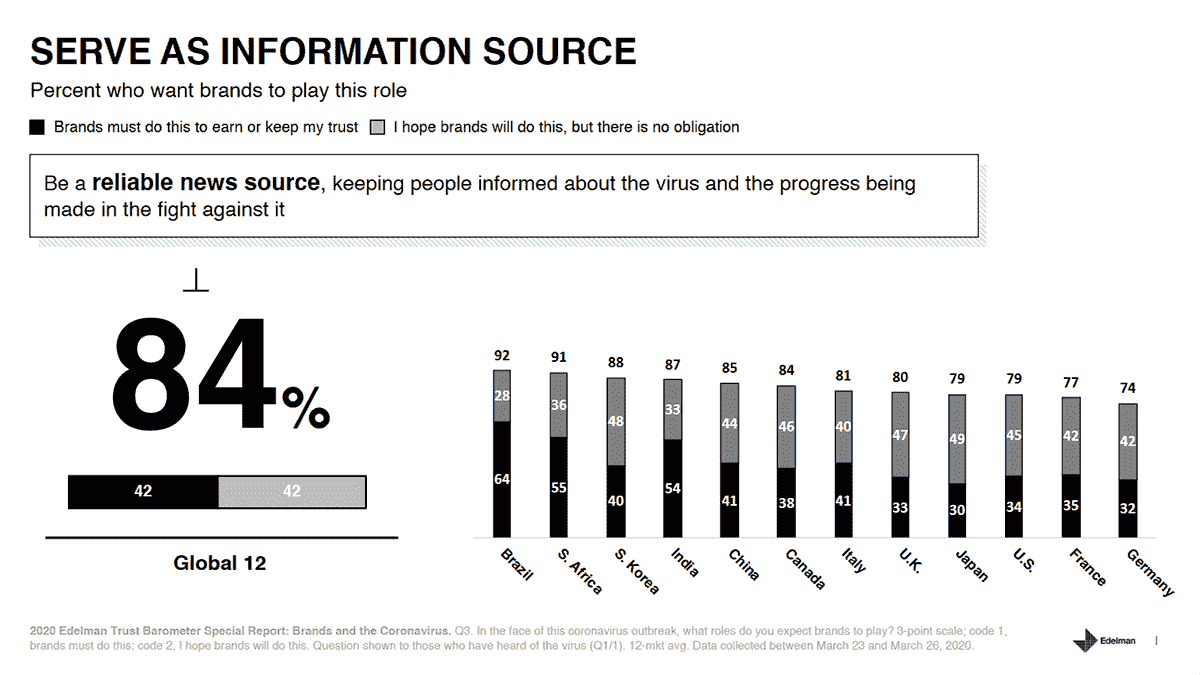
Be a reliable news source —Source: edelman.com
84% of respondents also said they want brand advertising to focus on how brands help people cope with pandemic-related life challenges — and 77% that they want brands only to speak about products in ways that show they are aware of the crisis and the impact on people’s lives.
Consumers also want brands to bring them together at this difficult time. 83% of respondents told Edelman that they want an emotional connection, which means helping them stay close to people they are being forced to physically distance from. The same percentage (83%) also want compassionate connection, including brand messaging that communicates empathy and support with the struggles they face. In addition, 84% want brand social channels to facilitate a sense of community and offer support to those in need.
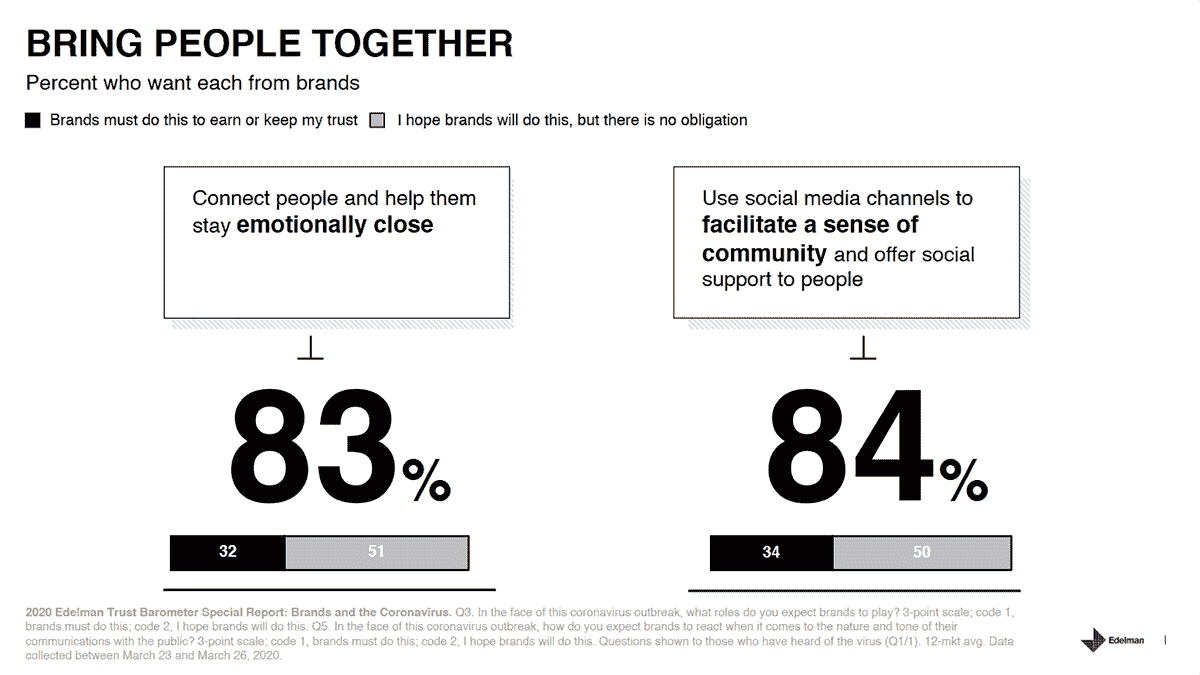
What roles brands are expected to play —Source: edelman.com
Final Thoughts
The global crisis will fundamentally change how consumers think, behave and consume. There will be no rapid “return to normal” — and so brands need to adapt their digital marketing strategies to the new normal and place trust at the core.
The new brand mandate is to solve problems for all, care for all, protect all, collaborate with all and innovate in the public interest. Brands that act in the interest of their customers, employees and society at large will earn the greatest trust.
Importantly, to maintain trust and continue to deliver excellent service as you reach out to customers through your digital marketing campaigns, you need a robust business information system to keep you in control.
metasfresh ERP seamlessly integrates with your CRM, CMS, and marketing applications like CleverReach. Having a powerful ERP system is essential to provide customers with a seamless experience and real-time access to product information, accurate pricing, product availability and shipping data across channels. This ensures that your marketing campaigns are kept in tight alignment with the rest of your business, and that all your content and website information is correct, updated in real-time, and customers receive a fast response and prompt deliveries.
Talk to us here at metasfresh. metasfresh is a member of the Ecommerce and Cross-Channel Club Cologne (ECC Club Köln), which is managed by the Institute for Retail Research Cologne (Institut für Handelsforschung, IFH Köln). The Institute offers individual research projects with strategic consulting. It specialises in the areas of inter-company comparisons as a controlling instrument, enabling retail companies to recognise market developments, measure changes in customer behaviour, optimise sales and set the course for a successful future. The insights and knowledge provided by the Institute through market research and studies relating to cross-channel and online retail are incorporated in the development of metasfresh, meaning all of our users are always up to date on the latest ecommerce developments.
At metasfresh, our mission is to enable each and every company to access a powerful ERP system that supports digital transformation and fuels corporate growth. Get in touch today for more information and insights.
Share this Post



